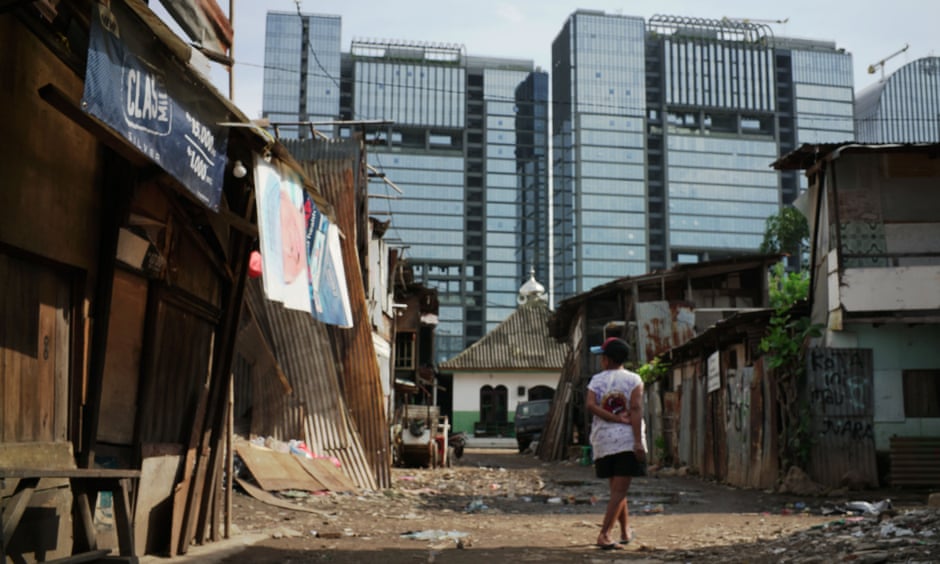KNews.id- Usually every Eid al-Adha, Riki Priyanto’s father would bring home goat or beef from the nearby mosque. The meat had been donated by devotees and distributed to the poor, like Riki’s family, to celebrate the Islamic day of sacrifice.
His mother would cook goat meat satay for their lunch and Riki would sit next to his three younger siblings in the middle of their 3x3m house in North Jakarta. They would eat the special meal together.
But this year is different. On Tuesday the house was quiet. This is the first Eid al-Adha they celebrated without their parents. Their mother died eight months ago; and two months ago their father died. Now they are running out of money to live.
The Covid pandemic, and the restrictions on mobility introduced to stop the spread of the virus, have been catastrophic for the poorest in Indonesia. With little financial support available, families face an impossible decision: go out to find what little work is available, and risk dying from the virus, or die at home because you can no longer afford to survive.
Adib Khumaidi, the head of the risk mitigation team at the Indonesian Medical Association, likened Indonesia’s Covid crisis to a survival of the fittest. “From the Covid taskforce we know that the current case fatality rate is 2.6%. That’s a big number,” he said.
“If they are exposed to [virus infection] then there is Charles Darwin’s theory; there is a natural selection of survival of the fittest. So, if their immunity is good, healthy, then they will survive … so the point is, don’t get sick.”
Riki’s parents died from medical conditions unrelated to Covid. As the oldest, Riki took the role of his father to earn money for his siblings. But the emergency restrictions have made everything more difficult.
“My brother and I usually work as porters at the electronic stores near here. But then the restriction began and the store closed,” the 24-year-old said. Because of financial reasons Riki and his brother only finished elementary school.
Riki said he usually could get around Rp79,000 ($5.4) a week from working at the store – not much, but he could buy food and books for his youngest sister. Now they have lost that stable income.
This week, president Joko Widodo announced emergency restrictions would be extended until 25 July due to the ongoing surge in Covid-19 transmissions.
While most accept that prevention measures are needed to slow Indonesia’s escalating case numbers, human right activists fear that, given the lack of financial support, the decision will make life even harder for the poorest and most vulnerable.
‘We have children to feed’
The pandemic has pushed Indonesian’s poverty rate up to 10.19%, the highest level since March 2017. Last year Statistic Indonesia recorded that the number of people living below the poverty line had reached 27.55 million in September 2020, up from 24.79 million a year earlier.
“Rich people can stay at their houses relying on their monthly income. But we have to go out there to earn money every day. If we don’t do that, then our family members who are still healthy will get sick from starving,” Eni Rochayati, the coordinator of the Jakarta Urban Poor Network, said.
“Stay at home, using masks, social distancing, all of these would not be working if we are starving. We don’t live alone. We have families, children to feed,” Eni said.
The government uses myriad terms – period of public activity restrictions and full large-scale social restrictions – to avoid using the word “lockdown”, Jakarta Legal Aid director Asfinawati said. Many suspect the government does so to avoid having to provide greater social support, which is an obligation under the country’s law on health quarantine.
On social media videos and pictures of officers forcing food sellers to close down their stalls have gone viral for the past few weeks.
A food seller in Jakarta, Adi Paharoni, 30, said he has argued with Jakarta Public Order Agency officers several times, after they asked him to close his small food stall due to the restrictions, which only allow sellers to stay open at certain times of day, provided they comply with strict health measures. He usually sells roasted chicken and fish in his tent from 5pm to 8pm.
“I told the officers I follow all of the health protocols. I told them if they closed my stall, how would I get the money to feed my family,” Adi said. “If they ever close mine today, I’ll open again tomorrow. I don’t care. I have to earn money. I can’t rely on the government.”
On 17 July, Adi’s father-in-law, who had been struggling with tuberculosis for years, died next to Adi, inside a bajaj, a three-wheeled motorised vehicle, when they were on the way to hospital to seek medical help.
“Now I have eight people to feed; my wife and my children, my mother-in-law and my sister’s three siblings,” Adi said. “This is very difficult but I don’t have other choices but to fight so we all can live.”
This week, Jokowi said an additional Rp55.21tn would be allocated to the social protection budget.
Indonesia’s Covid assistance programs have been mired in corruption allegations.
Eni said since the emergency restriction was implemented, most people have not received any social aid from the government. Last year some of them received social aid, but it was not as much as promised.
“[The ] government said we would get Rp300,000, but last year we received only around Rp120,000,” she said. “When we received it we still have to share it with other neighbours who don’t get them.”
Activists suspect there are many unrecorded Covid deaths among the urban poor, who cannot afford to get a test.
‘They did not die just because of Covid. They died because of poverty’
Across the nation gender minority groups are also becoming more vulnerable, especially where their status intersects with poverty. On 4 July the body of Dina, a transgender woman, was found on her bed in Yogyakarta by a friend who had not heard from her for three days. Dina, 55, died alone from Covid without ever getting medical help.
Rully Malay, a trans woman activist said they had to wait for eight hours before an ambulance came to bring Dina to the cemetery.
Dina usually sold roasted corn on the streets, but after emergency restrictions she was struggling to make ends meet.
Rully said since the beginning of pandemic, 11 trans women have died from Covid. Their community did not receive social aid from the government, because of administrative reasons; most of them do not have identification cards and do not come from Yogyakarta.
“They did not die just because of Covid. They died because of poverty. They could not access food or medicines or help,” Rully said. “Most of us are in the similar condition. There’s nothing else we have left to help each other.”
Riki also relies on family and neighbours to survive. He walks around his neighbourhood asking for odd jobs . “Sometimes I help them carry water to their houses. Clean someone’s motorcycles. Sometimes I get Rp 15,000 a day, but sometimes I don’t get anything at all.”. (Ade/gurdn)



